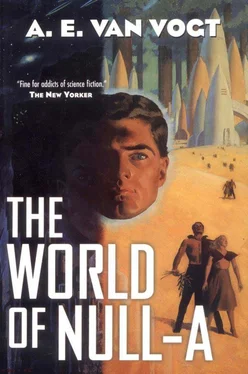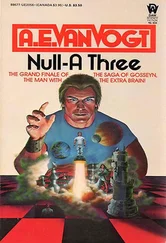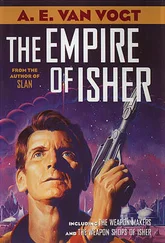“Don't be silly,” she said, “and try to save the world. You can't do anything. This plot is bigger than Earth, bigger than the solar system. We're pawns in a game being played by men from the stars.”
Gosseyn stared at her. “Are you crazy?” he said.
The moment he had spoken, he had a sense of blankness, a feeling of having heard words with too much meaning. He parted his lips to speak again, and then closed them. He recalled a word that Hardie had used earlier, “galactic.” Then he had been too intent for it to penetrate. Now-His mind began to retreat from the vastness of what was here. It grew smaller and smaller, and fastened finally on one thing the girl had said.
“Men?” he echoed.
The girl nodded. “But don't ask me how they got there. I don't even know how men got to Earth. The monkey theory seems plausible only when you don't examine it too closely. But let's not go into that, please. I'm glad they're men, and not alien monsters. I assure you the Machine can do nothing.”
“It might protect me.”
She frowned over that, then said slowly, “It might at that.” She studied him again with her bright eyes. “I don't understand where you fit into this. What did they find out about you?”
Gosseyn described succinctly what had been said, and added, “There must be something. The Machine also advised me to get my cortex photographed.”
Patricia Hardie was silent. “By God,” she said finally, “maybe they've got a right to be scared of you.” She broke off. “Sh-sh, somebody's at the outer door.”
Gosseyn had heard the musical chimes. He glanced back at the window. The girl said quickly, “No, don't go yet. Lock the door after me, and leave only if there's a search.”
He heard her footsteps going away. When they came back, they were accompanied by heavier ones. A man's voice said, “I wish I'd seen the man. Why didn't you tell me what you were up to? Even Thorson is scared now.”
The girl was calm. “How was I supposed to know he was different, Eldred? I talked to a person who had no memory of his past.”
Eldred, Gosseyn thought. He'd have to remember the name. It sounded more like a Christian than a family name. The man was speaking again.
“If it were anyone but you, Pat, I'd believe that. But I always have the feeling that you're playing a private game of your own. For heaven's sake, don't be too clever.”
The girl laughed. “My dear,” she said, “if Thorson ever suspects that Eldred Crang, commander of the local galactic base, and John Prescott, the vice-commander, have both been converted to null-A, then you'll have a reason to talk about private games.”
The man's voice sounded startled, hushed. “Pat, are you mad, even mentioning that? . . . But I've been intending to warn you. I no longer trust Prescott absolutely. He's been shifting and squirming ever since Thorson's arrival. Fortunately, I never let him find out about my feelings for null-A.”
The girl said something Gosseyn did not catch. There was silence, followed by the unmistakable sound of a kiss, and then her voice. “Is Prescott going with you?”
Gosseyn was trembling. “This is silly,” he thought angrily. “I was never married to her. I can't let a false belief disturb me emotionally.” But the feeling was unmistakable. The kiss shocked him. The emotion might be false, but it would require more than one null-A therapy to break its hold on him.
The sound of the door chimes ended the thought. He heard the man and the girl go into the living room. Then the door opened and a man said, “Miss Patricia, we have orders to search this apartment for an escaped prisoner. . . . I beg your pardon, Mr. Crang. I didn't see you there.”
“It's all right.” It was the voice of the man who had kissed Patricia Hardie. “Complete your search and then depart.”
“Yes, sir.”
Gosseyn waited for no more. The balcony that led from the dressing-room window was tree-sheltered. He reached the ground without incident, and edged along the wall on his hands and knees. Not once, in those first few hundred yards, was he out of the shelter of a shrub or a tree.
He was a hundred feet from the almost deserted base of the Machine when a dozen cars careened from behind a line of trees, where they had been waiting, and guns opened fire at him. Gosseyn gave one wild shout at the Machine:
“Help me! Help!”
Aloof and unheeding, the Machine towered above him. If it was true, as legend said, that it was able to defend itself and its grounds, then there apparently was no reason for action. Not by a flicker of a tube did it show awareness of the outrage that was being done in its presence.
Gosseyn was crawling frantically along the grass when the first bullet actually struck him. It hit one shoulder and sent him spinning into the path of a burning energy beam. His clothes and flesh flared in an insanity of flame; and then he had rolled over and the bullets were focused again. They began to rip him apart as he burned with an incandescent fury.
The unbearable part was that he clung to consciousness. He could feel the unrelenting fire and the bullets searching through his writhing body. The blows and the flame tore at his vital organs, at his legs, his heart, and his lungs even after he had stopped moving. His last dim thought was the infinitely sad, hopeless realization that now he would never see Venus and its unfathomed mysteries.
Somewhere along there, death came.
A curious, heavy sound impinged upon Gosseyn's attention. It seemed to come from above him. It grew louder rapidly and became a continuous noise, like the roar of many smoothly operating machines.
Gosseyn opened his eyes. He was lying in half darkness beside the trunk of a titanic tree. He could see two more trunks dimly in the near distance, but their size was so improbable that he closed his eyes and lay quiet, listening. He had no other immediate awareness. His brain was a composite of ears and what the ears were hearing. Nothing else. He was an inanimate object with the ability to detect sounds.
Further awareness crept in upon him. He could feel his body lying on the ground. No visual image was involved, but gradually the impression in his mind extended. Himself being held up by the soil of Venus, solidly, strongly supported by the impregnable planetary base that was Venus.
The slow flow of thoughts changed. Venus! But he wasn't on Venus. He was on Earth. Memory awakened in a remoter section of his mind. The trickle of impulse-patterns became a stream, then a wide, dark river rushing toward a great sea.
“I died,” he told himself. “I was shot and burned to death.”
He cringed with the remembrance of hideous pain. His body pressed hard against the ground. Slowly his mind opened out again. The fact that he was alive with the memory of having been killed became less a thing of remembered agony, more a puzzle, a paradox that had no apparent explanation in the null-A world.
The fear that the pain would resume dimmed with the passing of the uneventful minutes. His thought, in that curious semiconscious world in which he had his momentary being, began to concentrate on different aspects of his situation.
He remembered Patricia Hardie and her father. He remembered “X” and the implacable Thorson, and that there was a plot against null-A.
The memory had an enormous, purely physical effect on him. He sat up. He opened his eyes and found himself in the same half darkness as before; it had not been a dream then.
He saw the monstrous trees again. This time he accepted them for what they were. It was they that must have given him his automatic knowledge that he was on Venus. Everybody knew about the trees on Venus.
He was definitely on Venus.
Читать дальше










